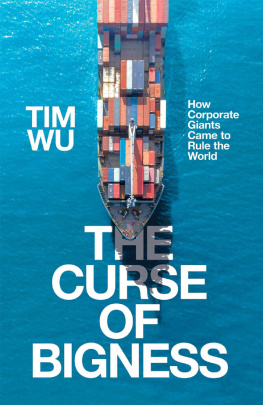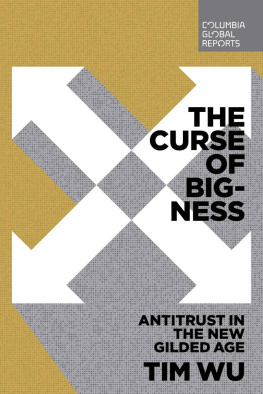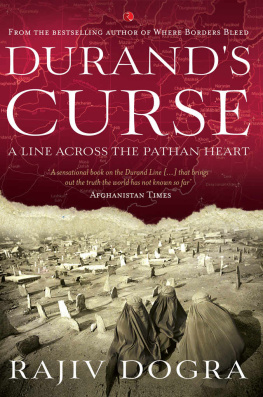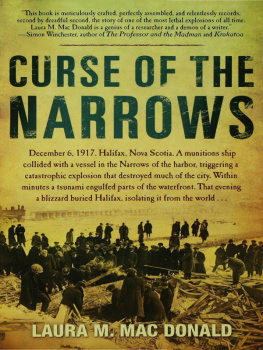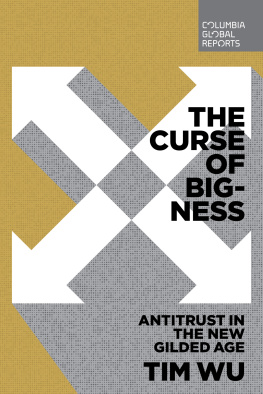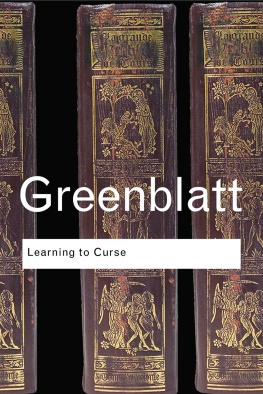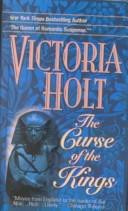Tim Wu - The Curse of Bigness
Here you can read online Tim Wu - The Curse of Bigness full text of the book (entire story) in english for free. Download pdf and epub, get meaning, cover and reviews about this ebook. publisher: Atlantic Books, genre: Politics. Description of the work, (preface) as well as reviews are available. Best literature library LitArk.com created for fans of good reading and offers a wide selection of genres:
Romance novel
Science fiction
Adventure
Detective
Science
History
Home and family
Prose
Art
Politics
Computer
Non-fiction
Religion
Business
Children
Humor
Choose a favorite category and find really read worthwhile books. Enjoy immersion in the world of imagination, feel the emotions of the characters or learn something new for yourself, make an fascinating discovery.
The Curse of Bigness: summary, description and annotation
We offer to read an annotation, description, summary or preface (depends on what the author of the book "The Curse of Bigness" wrote himself). If you haven't found the necessary information about the book — write in the comments, we will try to find it.
Tim Wu: author's other books
Who wrote The Curse of Bigness? Find out the surname, the name of the author of the book and a list of all author's works by series.
The Curse of Bigness — read online for free the complete book (whole text) full work
Below is the text of the book, divided by pages. System saving the place of the last page read, allows you to conveniently read the book "The Curse of Bigness" online for free, without having to search again every time where you left off. Put a bookmark, and you can go to the page where you finished reading at any time.
Font size:
Interval:
Bookmark:

THE
CURSE
OF
BIGNESS
Tim Wu is Professor of Law, Science and Technology at Columbia Law School and a contributing writer for the New York Times. He previously worked for Barack Obama and is the author of The Master Switch and The Attention Merchants.

First published in the United States in 2018 by Columbia Global Reports, New York.
Published in hardback in Great Britain in 2020 by Atlantic Books, an imprint of Atlantic Books Ltd.
Copyright Tim Wu, 2018, 2020
The moral right of Tim Wu to be identified as the author of this work has been asserted by him in accordance with the Copyright, Designs and Patents Act of 1988.
All rights reserved. No part of this publication may be reproduced, stored in a retrieval system, or transmitted in any form or by any means, electronic, mechanical, photocopying, recording, or otherwise, without the prior permission of both the copyright owner and the above publisher of this book.
Every effort has been made to trace or contact all copyright holders. The publishers will be pleased to make good any omissions or rectify any mistakes brought to their attention at the earliest opportunity.
10 9 8 7 6 5 4 3 2 1
A CIP catalogue record for this book is available from the British Library.
Hardback ISBN: 978 1 83895 082 8
E-book ISBN: 978 1 83895 083 5
Printed in Great Britain
Atlantic Books
An imprint of Atlantic Books Ltd
Ormond House
2627 Boswell Street
London
WC1N 3JZ
www.atlantic-books.co.uk
For Gillian Elizabeth, my mother, who always thought I should have been a scientist
We are three decades into a major global experiment. What happens when the nations of the world weaken their controls on the size and power of industrial giants? What happens when countries, in the name of globalism, grandly subsidize their wealthiest and most powerful firms?
The answers, I think, are clear. Look at the global economy and witness the rule of concentrated monopolies and oligopolies, the by-product of decades of consolidation across industries like agriculture, finance and pharmaceuticals. Witness the power of the great tech platforms, like Google and Facebook, which have gained an extraordinary power over our lives and collectively know more about everyone than anyone. And behold the unconscionable concentration of global wealth, the yawning gap between the rich and poor, most clearly manifest in the international class of billionaires who inhabit their own sovereignty.
Back in the 1990s, the promise of globalization was that the elimination of trade barriers and the rise of global supply chains would yield a broad spreading of wealth to everyone. There was, to be sure, debate over who would benefit from such competition, and worries about displaced workers and environmental impact. But in retrospect, the advocates of globalization and even some of its critics forgot something more fundamental about how capitalism works. They failed to realize that globalization might breed a new class of monopoly that would drain wealth from everyone: workers, suppliers and producers. They also forgot that some nations would seek precisely that outcome in the name of progress.
The result is that a great concentration of wealth and private power has now transformed and radicalized politics around the globe, as a disaffected and declining middle class, those who feel left behind, have come to support increasingly radical solutions. In nations around the world Brazil, Britain, Hungary, the United States and others have emerged nationalist movements that, in their more extreme forms, resemble the most dangerous movements of the 1930s. They blame the same scapegoats immigrant workers, foreigners, gays or elite conspiracies for the diminishment of the middle class, while calling for an enlargement of state power in a manner that can only be described as terrifying.
What we are facing is a global Curse of Bigness that represents a profound and dangerous threat to economic thriving for the broader public, but also to liberal democracy itself. For we have, incautiously, given up on the ideal of economic democracy, while forgetting that economic dictatorship tends to beget political dictatorship. The operating premise of a democracy is that it makes the people of a nation sovereign over their affairs. Yet around the world, in so many nations, people do not feel that way.
The patterns we are seeing should be familiar to any student of twentieth-century history. If we learned one thing from the last century, it should have been this: the road to fascism and dictatorship is paved with failures of economic policy to serve the needs of the broader public. Gross inequality and material suffering feed a dangerous appetite for nationalistic and extremist leadership. Yet, as if blind to these lessons, we are going down the same path.
The questions we need to face are these: Is tolerance of global monopoly and oligopoly actually compatible with the premise of basic equality among citizens, industrial freedom, or democracy itself? Can we create broad-based wealth in many regions, not just a few, and also a real sense of opportunity in economies dominated by monopolists? Is there just too much concentrated private power in too few hands, which has too much influence over government? The questions, I think, answer themselves.
But it is not enough to diagnose the problem. The goal of this book is to rediscover a classic answer to the problem of bigness: a programme of anti-monopoly and the redistribution of monopoly profit. To do this we need to relearn the lessons taught by two groups of important thinkers: the European Ordoliberals and those of the Anglo-American anti-monopoly tradition. These are thinkers whose influence was paramount after the catastrophe of the Second World War.
Unfortunately, over the last thirty years, beginning in the United States, the anti-monopoly tradition has begun to shrink, and in some instances, nearly disappear. The problem is an overindulgence in the extreme ideas first advocated by American conservatives in the 1960s that have been repackaged and globalized. Stated succinctly, an embrace of technocratic neoliberalism has transmuted into the tolerance or even an embrace of monopoly, while shedding the historic concerns over excessive political power and political influence.
The ideas that originated with the American right, and severely weakened the anti-monopoly tradition in its home country, have spread to the centre and around the world. In Europe, the home of the Ordoliberal tradition, competition officials, while superficially very active, have nonetheless too often accepted and approved the consolidation campaigns of global industries. While well intentioned, in the pursuit of technocratic rigour, Europeans have too easily accepted a narrow view of their powers, sensitive only to questions of efficiency and with greater indifference to the growth of private power or the potential corruption of democracy.
Finally, most of the major Asian economies have been too willing to accept close ties between private industry and government, sometimes embracing state-directed capitalism. This variety of capitalism can be very effective over the short term; but its longer historical record is troubling for not just economic but political reasons. Japan, both before and after the Second World War, is the most recent nation to demonstrate both the political and economic dangers, and China has begun to make clear the alarming possibilities that come from the potent mixture of private and public power.
Font size:
Interval:
Bookmark:
Similar books «The Curse of Bigness»
Look at similar books to The Curse of Bigness. We have selected literature similar in name and meaning in the hope of providing readers with more options to find new, interesting, not yet read works.
Discussion, reviews of the book The Curse of Bigness and just readers' own opinions. Leave your comments, write what you think about the work, its meaning or the main characters. Specify what exactly you liked and what you didn't like, and why you think so.

